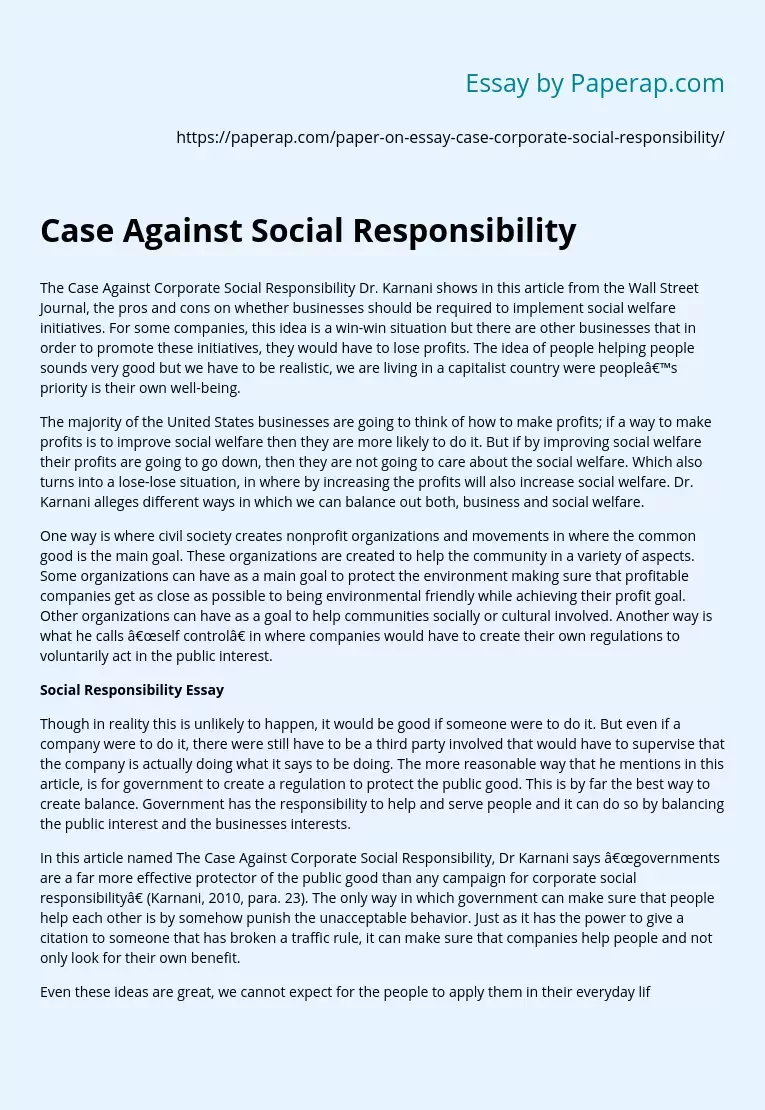Case Against Social Responsibility
The Case Against Corporate Social Responsibility Dr. Karnani shows in this article from the Wall Street Journal, the pros and cons on whether businesses should be required to implement social welfare initiatives. For some companies, this idea is a win-win situation but there are other businesses that in order to promote these initiatives, they would have to lose profits. The idea of people helping people sounds very good but we have to be realistic, we are living in a capitalist country were people’s priority is their own well-being.
The majority of the United States businesses are going to think of how to make profits; if a way to make profits is to improve social welfare then they are more likely to do it. But if by improving social welfare their profits are going to go down, then they are not going to care about the social welfare. Which also turns into a lose-lose situation, in where by increasing the profits will also increase social welfare.
Dr. Karnani alleges different ways in which we can balance out both, business and social welfare.
One way is where civil society creates nonprofit organizations and movements in where the common good is the main goal. These organizations are created to help the community in a variety of aspects. Some organizations can have as a main goal to protect the environment making sure that profitable companies get as close as possible to being environmental friendly while achieving their profit goal. Other organizations can have as a goal to help communities socially or cultural involved.
Another way is what he calls “self control” in where companies would have to create their own regulations to voluntarily act in the public interest.
Social Responsibility Essay
Though in reality this is unlikely to happen, it would be good if someone were to do it. But even if a company were to do it, there were still have to be a third party involved that would have to supervise that the company is actually doing what it says to be doing. The more reasonable way that he mentions in this article, is for government to create a regulation to protect the public good. This is by far the best way to create balance. Government has the responsibility to help and serve people and it can do so by balancing the public interest and the businesses interests.
In this article named The Case Against Corporate Social Responsibility, Dr Karnani says “governments are a far more effective protector of the public good than any campaign for corporate social responsibility” (Karnani, 2010, para. 23). The only way in which government can make sure that people help each other is by somehow punish the unacceptable behavior. Just as it has the power to give a citation to someone that has broken a traffic rule, it can make sure that companies help people and not only look for their own benefit.
Even these ideas are great, we cannot expect for the people to apply them in their everyday life. The reality is that people and businesses have become selfish and greedy and it is hard to trust and help people without being cheated out or taken advantage of. In an article called Beyond Selfishness, Henry Mintzberg, Robert Simons and Kunal Basu said “A syndrome of selfishness, built on a series of half-truths, has taken hold of our corporations and our societies, as well as our minds.
This calculus of glorified self-interest and the fabrications upon which it is based must be challenged. ” (Mintzberg, Simons, & Basu, 2002, para. 1). It is in human nature to think of your own well being before other’s people. Most of the rich people only think on making sure they stay that way, and poor people are left trying to survive the lifestyles the rich people have created. Companies hire people imposing rules and trainings to make sure the employees can help them achieve certain profit goal.
In order to live up to the lifestyles that have been created, employees are in the necessity to follow this rules and act the way the companies want them to act. A lot of times employees are overworked and exploited by companies, up to the point that we are not even sure if we work to live or we live to work. Conclusion Government has the responsibility to ensure the well being of all the people, but sometimes we forget that the government is also made out of people.
It is easy to blame someone for something but we need to start taking responsibility in our own actions and start with ourselves if we want to find balance in life and with each other.
Reference Karnani, A. (2010). The case against corporate social responsibility. WALL STREET JOURNAL/MIT SLOAN, (), . Retrieved from http://sloanreview. mit. edu/executive-adviser/articles/2010/3/5231/the-case-against-corporate-social-responsibility/ Mintzberg, H. , Simons, R. , & Basu, K. (2002). Beyond Selfishness. THE MAGAZINE, (), . Retrieved from http://sloanreview. mit. edu/the-magazine/articles/2002/fall/4417/beyond-selfishness/
Case Against Social Responsibility. (2019, Dec 05). Retrieved from https://paperap.com/paper-on-essay-case-corporate-social-responsibility/

